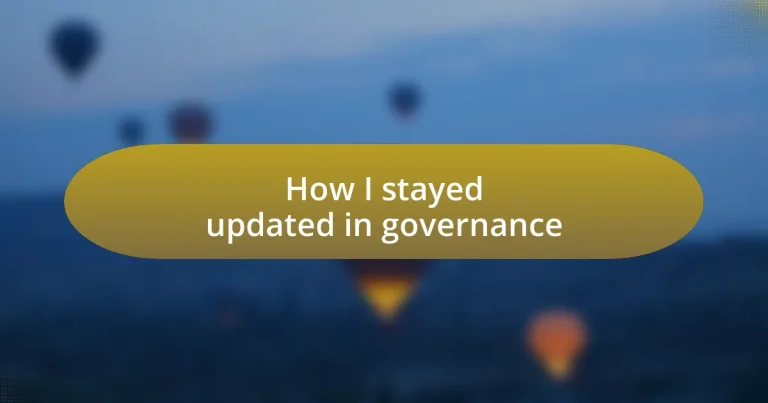Key takeaways:
- Governance principles such as transparency, accountability, and equity are crucial for effective organizational operation and community trust.
- Identifying reliable news sources is essential; one should cross-check facts, prefer established outlets, and value transparency in sourcing.
- Engaging with thought leaders through social media, podcasts, and networking events enhances understanding of governance complexities.
- Participating in workshops and online courses facilitates learning and collaboration, allowing for the application of governance strategies in real-world scenarios.
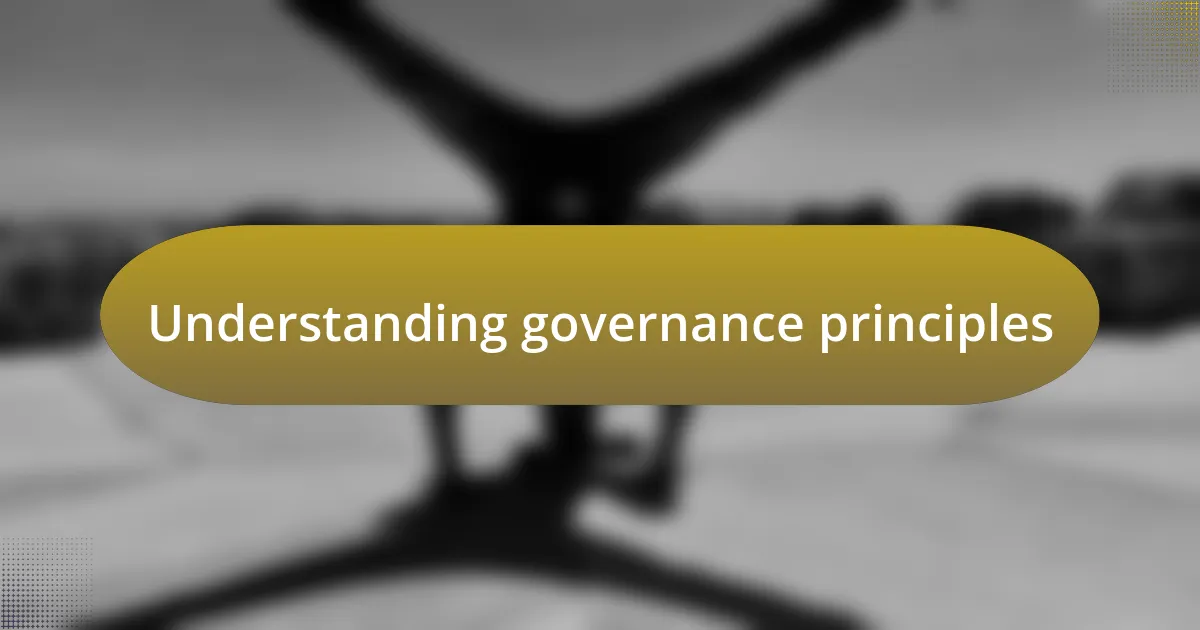
Understanding governance principles
Governance principles form the foundation for how organizations and entities operate effectively. I still remember my first encounter with these principles during a community development meeting; it was fascinating to see how transparency and accountability shaped robust discussions. What struck me was how essential it is for leaders to uphold these values, creating trust within the community.
When I think about participation, I can’t help but recall an initiative I was involved in. We organized a series of workshops that encouraged diverse voices to join the decision-making process. It was eye-opening to see how inclusive governance not only empowered individuals but also led to innovative solutions that truly reflected the community’s needs. Isn’t it interesting how engaging everyone leads to richer outcomes?
Moreover, I’ve learned that the principle of equity often gets overlooked. During a project aimed at improving local infrastructure, I witnessed the frustration of marginalized groups whose needs were not adequately addressed. This experience taught me that prioritizing equity in governance ensures that everyone has a seat at the table, and the overall success of initiatives is significantly enhanced. How can we truly call ourselves governed if we ignore the voices that matter most?
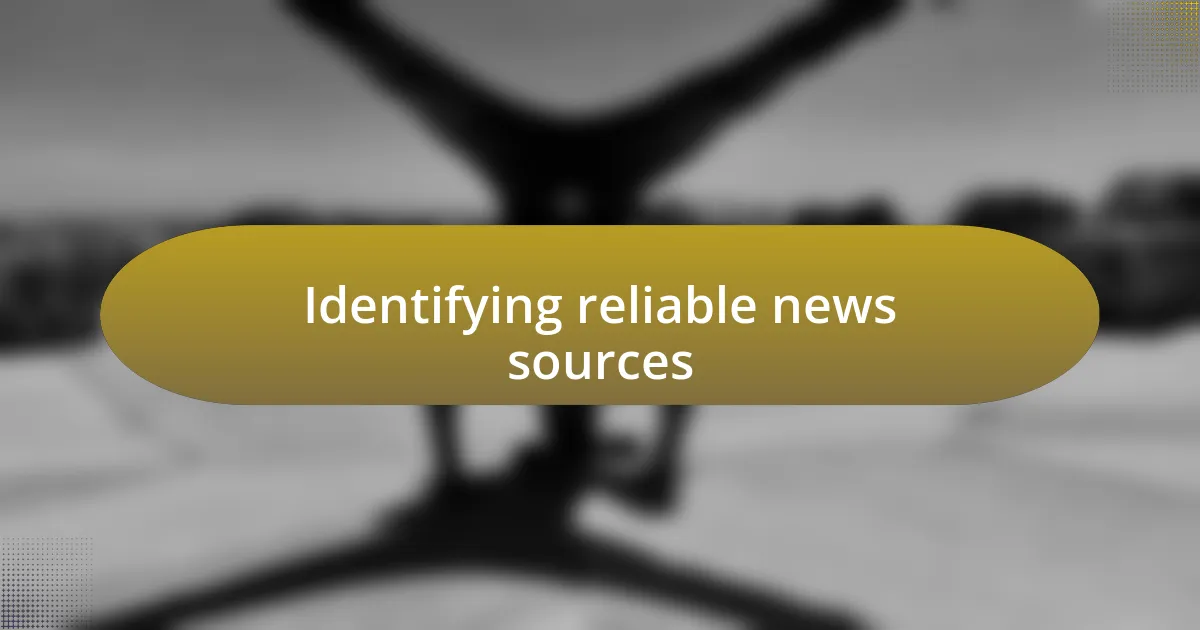
Identifying reliable news sources
Identifying reliable news sources is crucial in today’s fast-paced information environment. From my experience, it’s essential to cross-check facts against multiple sources to ensure accuracy. I remember a time when I initially trusted an article that turned out to be misleading; it was a wake-up call about the importance of scrutinizing where my information came from.
I often find myself gravitating towards established outlets with a history of journalistic integrity. For instance, while social media can be a quick way to get updates, I prefer to balance those with in-depth reporting from reputable organizations. A particular incident sticks in my mind: I followed breaking news on a major event exclusively through social channels, only to realize much later that there were significant omissions in the coverage. It truly reinforced my belief in seeking out thorough, well-researched articles.
Additionally, it’s beneficial to consider the transparency of news sources. I value organizations that provide context and sources for their information. For example, a news piece I read recently explained its sourcing process, allowing me to understand how the story developed. The trust that builds from these practices can significantly influence how I perceive and accept the information shared by various outlets.
| Criteria | Reliable Sources | Unreliable Sources |
|---|---|---|
| Fact-checking | Thoroughly fact-checked | Often lacks verification |
| Transparency | Sources clearly cited | Ambiguous sourcing |
| Reputation | Established journalistic standards | Reputation may be questionable |

Following key thought leaders
Following key thought leaders in governance has been an invaluable part of my growth in understanding the complexities of this field. I remember attending a seminar where a prominent expert spoke about the intersection of technology and public policy. The insights gained from that experience reshaped my perspective, emphasizing how crucial it is to prioritize voices that provoke thoughtful discourse. I often turn to those individuals whose ideas challenge the status quo, enriching my understanding and prompting me to think critically about pressing issues.
To stay connected with these thought leaders, I actively engage in the following practices:
- Social Media: I follow influential figures on platforms like Twitter and LinkedIn for real-time updates and diverse viewpoints.
- Podcasts and Webinars: I listen to various podcasts that feature discussions with leading experts, which often provide deep dives into current governance trends.
- Books and Articles: I seek out books by thought leaders that delve into governance challenges, as they often contain well-researched perspectives.
- Networking Events: Attending conferences and panel discussions allows me to interact directly with these individuals and absorb their insights firsthand.
By prioritizing these strategies, I find that my understanding of governance is continually refreshed, keeping me engaged with the latest ideas in the field.
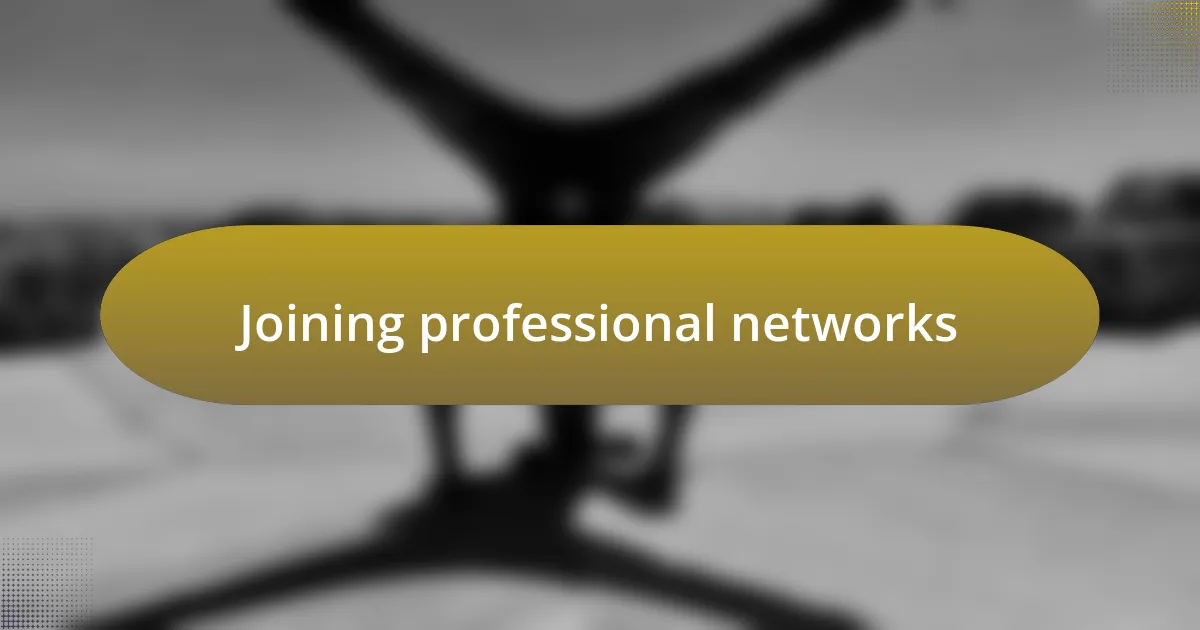
Joining professional networks
Joining professional networks has been a game changer for me in navigating the ever-evolving landscape of governance. I recall the time I joined a local governance association where I met professionals who had faced challenges similar to mine. Engaging in discussions with them opened my eyes to new strategies and perspectives that I had never considered before, making me realize just how valuable collaboration can be.
In these networks, I’ve witnessed firsthand the power of collective knowledge. I remember participating in a roundtable discussion that explored innovative governance practices. The variety of experiences shared among members not only sparked inspiring ideas but also reinforced the importance of diverse viewpoints in shaping effective policies. Have you ever found clarity in a seemingly chaotic issue through collaboration? I certainly have, and it made me appreciate the strength that comes from community support.
The ongoing connections I’ve built through these professional networks have also provided a steady flow of resources and opportunities. A colleague introduced me to a mentorship program, and the guidance I received from my mentor was instrumental in developing my understanding of regulatory frameworks. This experience is a testament to how being part of a professional network can actively foster personal growth and lead to meaningful career advancement. Isn’t it fascinating how a single connection can propel your journey forward?

Attending governance workshops
Attending governance workshops has been an enlightening experience for me, allowing me to dive deep into pressing issues in the field. I clearly remember a workshop focused on public policy reform where I was engaged in dynamic conversations that challenged my preconceived notions. This direct interaction with experts and peers created an enriching environment; it’s amazing how just a few hours can shift your entire perspective on governance.
One workshop in particular left a lasting impression on me. It featured a case study that highlighted successful community engagement in governance. I was struck by the various methods discussed and how they resonated with my own experiences. Reflecting on those methods, I found myself asking: how can I implement these strategies in my community? That question has driven my commitment to continuous learning and exploration of innovative governance techniques.
Moreover, the networking opportunities at these workshops are invaluable. I often leave with connections that evolve into collaborative projects. Just the other day, I reconnected with someone I met at a workshop last year, which led to brainstorming ideas to tackle a local governance issue. Isn’t it incredible how these workshops can facilitate relationships that not only enhance our understanding but also inspire action?
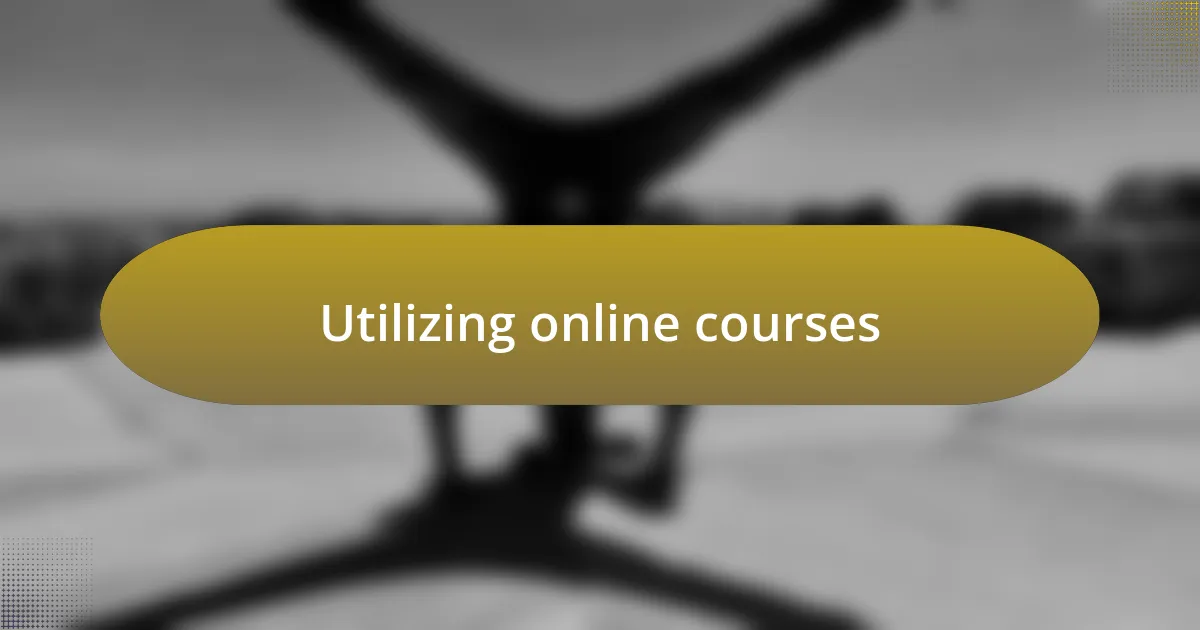
Utilizing online courses
Online courses have been a game-changer for me in staying updated on governance topics. I remember enrolling in a course about ethical leadership that was particularly eye-opening. The flexibility of online learning allowed me to explore complex concepts at my own pace, and I often found myself reflecting on how ethical practices could be applied to real-life scenarios.
One memorable assignment required us to analyze case studies of governance failures. I discovered trends that directly related to my experiences in local government. I started wondering: how can lessons from those cases inform my approach to decision-making? This kind of critical thinking, sparked by an online environment, has been instrumental in refining my understanding of effective governance.
Additionally, the accessibility of various online platforms has expanded my horizons immensely. I often participate in webinars featuring renowned experts from around the world, which has left me feeling more connected to global governance challenges. After one such session, I felt motivated to research international case studies. Isn’t it fascinating how online courses can ignite curiosity and lead to a deeper understanding of complex issues we face in governance today?
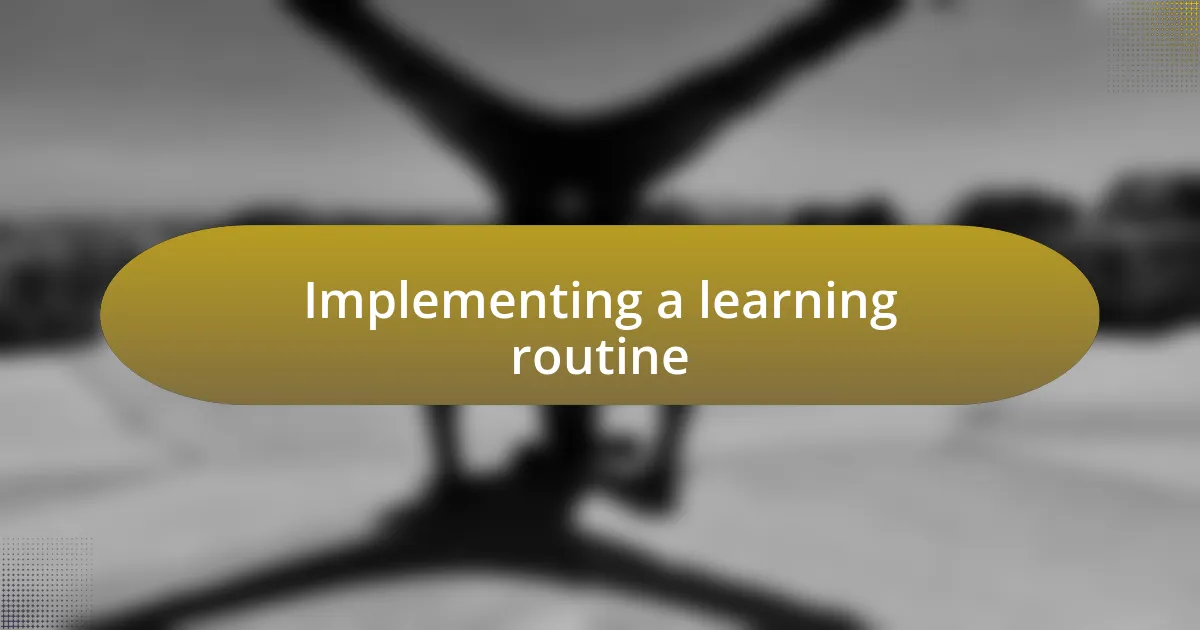
Implementing a learning routine
Incorporating a structured learning routine has profoundly impacted my ability to stay current in governance. Each week, I dedicate specific time slots solely for learning—be it reading articles, watching tutorials, or engaging with webinars. This consistency not only keeps me informed but also fosters a mindset of curiosity. Have you ever noticed how a regular schedule helps transform studying into a habit rather than a chore?
I also reflect on what I learn during these sessions. For example, after digging into governance frameworks last month, I took the time to apply those concepts to my own experiences in community leadership. I remember feeling a sense of empowerment as I recognized how theoretical principles translated into actionable strategies in my role. Creating space for reflection has truly allowed me to internalize knowledge and see its relevance in everyday governance challenges.
Moreover, sharing insights with peers has become a vital part of my learning routine. I recall a recent discussion with colleagues about implementing digital tools in governance, which sparked a collaborative project. Engaging in dialogue not only deepens my understanding but also opens doors to innovative ideas. Isn’t it rewarding when learning becomes a communal experience rather than a solitary task?

